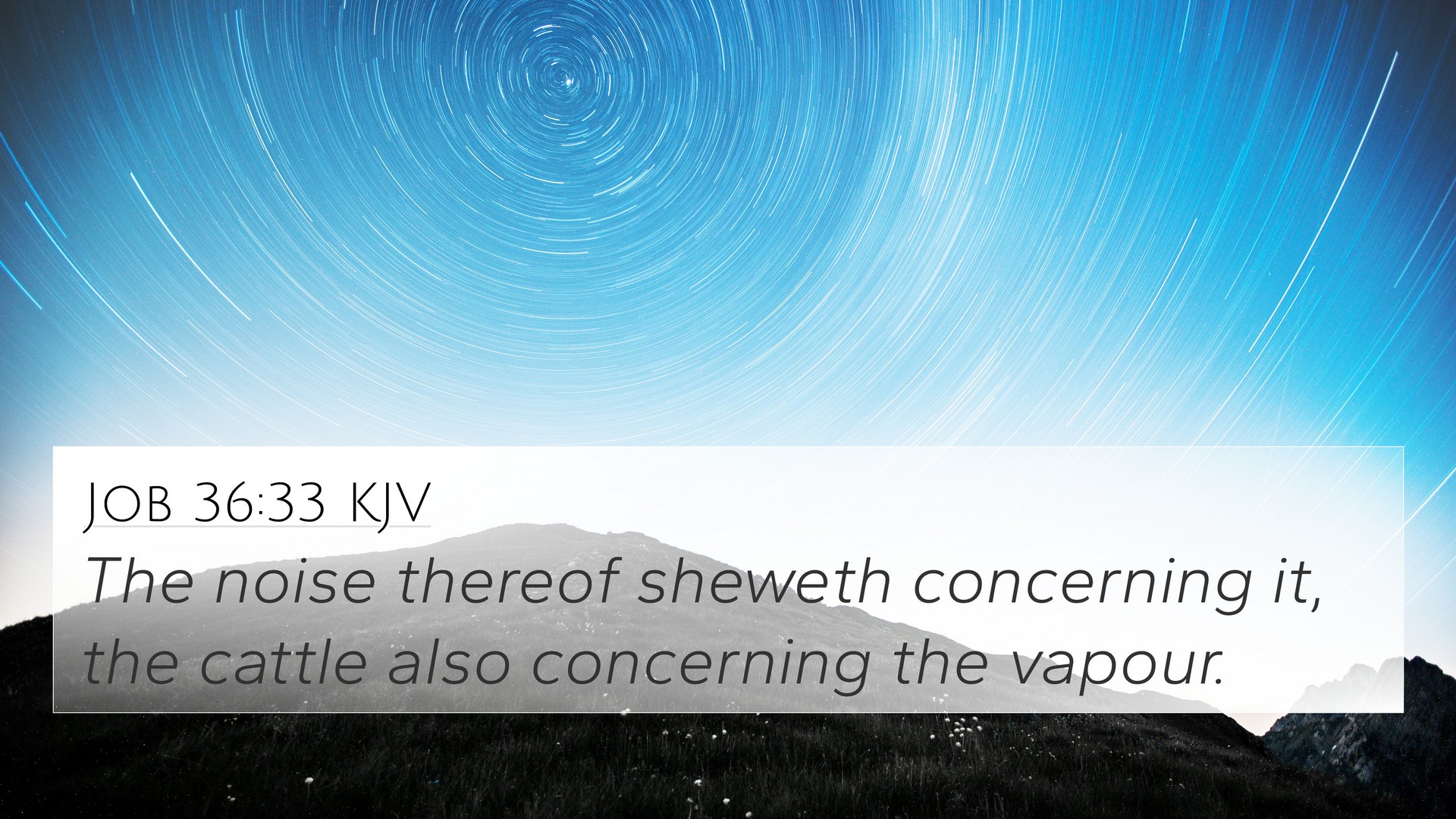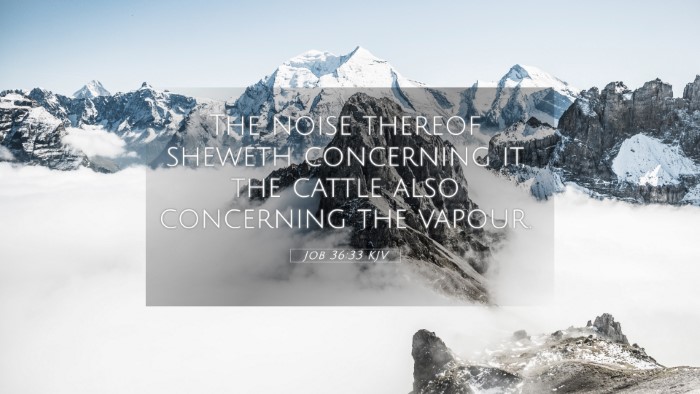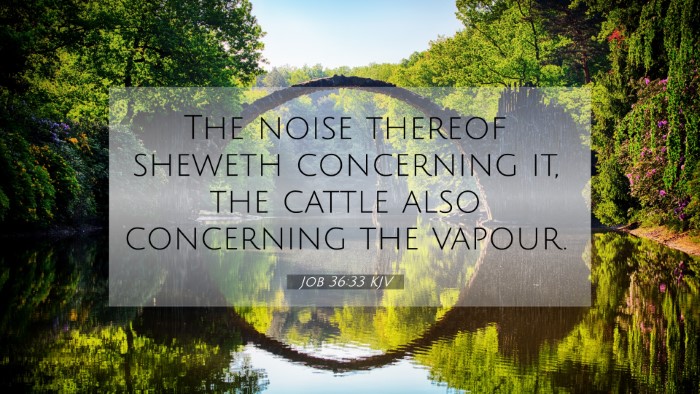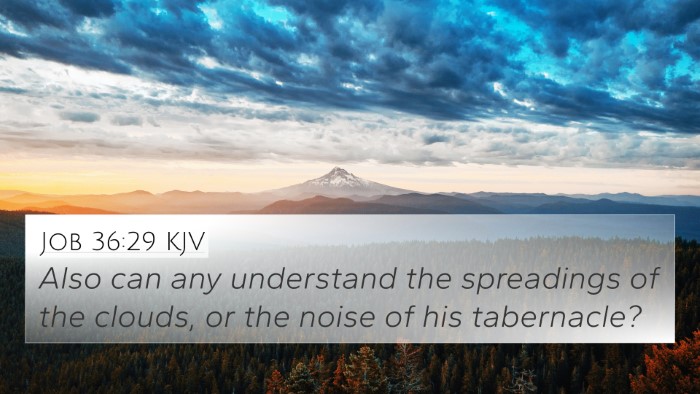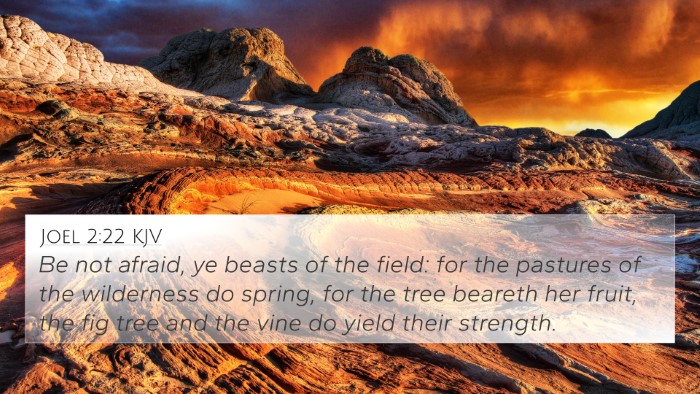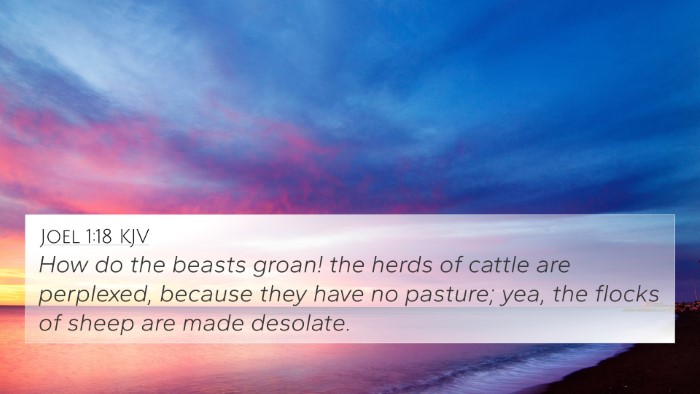Interpretation and Meaning of Job 36:33
Job 36:33 states, "The noise thereof showeth concerning it, the cattle also concerning the vapour." This verse elaborates on the majesty and sovereignty of God over nature, particularly through storms, illustrating a profound communication of divine power and the natural world.
Overview
In this passage, the speaker is highlighting how even the natural phenomena serve as a testimony to God’s presence and sovereignty. The verse reflects on the connection between God's voice through the elements and the awareness it creates in creation, particularly in livestock which are sensitive to changes in weather. Below are insights gleaned from public domain commentaries:
Commentary Insights
- Matthew Henry: He points out the implications of God's power displayed in thunder and storms. Henry notes that these manifestations of divine might serve as reminders to humankind about obedience and reverence toward God.
- Albert Barnes: Barnes emphasizes the theological significance of the voice of God in creation, asserting that the responsiveness of nature shows awareness of God’s commands, and that it calls human beings to heed God’s authority.
- Adam Clarke: Clarke elaborates on the context of the natural phenomena and the cattle's reaction, interpreting them as indicative of the divine's care for creation and the communication of God's will through observable signs.
Key Themes
- Divine Sovereignty: God's control over nature reflects His greatness.
- Creation’s Response: All of creation, including cattle, responds to God’s authority, showcasing a holistic relationship between God and nature.
- Symbolism of Weather: Thunder and storms symbolize God's voice, characterizing divine communication.
Bible Cross-References
This verse connects to other scriptural passages, establishing a broader biblical context about God's sovereignty and communication through nature:
- Psalm 29:4 - "The voice of the Lord is powerful; the voice of the Lord is full of majesty."
- Job 37:6 - "For He saith to the snow, Be thou on the earth; likewise to the small rain, and to the great rain of His strength."
- Isaiah 55:12 - "For ye shall go out with joy, and be led forth with peace: the mountains and the hills shall break forth before you into singing."
- Psalm 19:1 - "The heavens declare the glory of God; and the firmament sheweth His handywork."
- Jeremiah 10:13 - "When He uttereth His voice, there is a multitude of waters in the heavens; and He causeth the vapours to ascend from the ends of the earth."
- Matthew 8:27 - "But the men marvelled, saying, What manner of man is this, that even the winds and the sea obey Him!"
- Romans 1:20 - "For the invisible things of Him from the creation of the world are clearly seen, being understood by the things that are made."
Connections Between Bible Verses
The connections highlighted in Job 36:33 and its cross-references enrich the understanding of divine communication throughout scripture. These inter-biblical dialogues illustrate a fundamental theme of God's sovereignty over nature and His willingness to engage creation in profound ways.
Exploring Themes Through Cross-Referencing
Engaging in bible verse cross-referencing is essential for a deeper understanding of the scriptures. This practice allows for:
- Comparative Bible verse analysis: by examining connections between verses, one can observe recurring themes and messages within the text.
- Thematic Bible verse connections: such as how different verses illustrate God's relationship with His creation across both the Old and New Testaments.
- Identifying connections between Old and New Testament: understanding the continuity of God's nature and communication methods throughout scripture.
Conclusion
Job 36:33 serves not only as a reminder of God's omnipotence but also invites readers to pay attention to the signs of God’s presence in the world around them. Through careful study and cross-referencing Bible texts, one can appreciate the depth and unity of scripture, recognizing the intricate ways God communicates with His creation.
